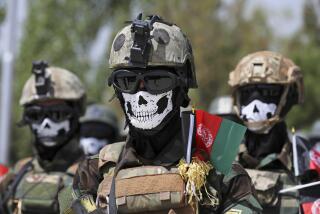Soviet Leaders Seen Tied to ’88 Afghan Pullout
- Share via
MOSCOW — Top Kremlin officials have now staked their prestige on a withdrawal of Soviet troops from Afghanistan this year without linking it to survival of the present Moscow-backed regime in Kabul, Western diplomats believe.
The main Soviet condition for a pullout of an estimated 115,000 troops after eight years of an inconclusive war is an immediate halt in military aid to the rebel forces by the United States and other suppliers.
Soviet Foreign Minister Eduard A. Shevardnadze delivered the Kremlin message last week to Afghan President Najibullah in Kabul, adding that conditions are favorable for a negotiated settlement of the fighting.
Anatoly F. Dobrynin, a powerful secretary of the Communist Party Central Committee, reinforced the theme in a meeting Friday with American political leaders.
“Our basic position is to withdraw (Soviet forces) within 12 months,” Dobrynin said. “We are prepared to begin withdrawal within 12 months, maybe less.”
A senior Western diplomat here, analyzing the Soviet stance, said it is a welcome public reiteration of what American officials have been told privately in recent months.
“We still have to learn what their negotiating position is at the Geneva talks in February,” the diplomat said, referring to indirect talks between Pakistan and Afghanistan with the aid of United Nations mediator Diego Cordovez.
The United States favors a quicker withdrawal of Soviet forces, with large numbers going early to show that the exodus cannot be reversed, this analyst added.
No Champagne Yet
“My impression is that it’s going to take another round (of talks) to work out,” he added. “I don’t think it’s time to uncork the champagne.”
Other Western observers said the Soviet Union appears to be signaling that it no longer will commit its troops in Afghanistan to preserve the Najibullah regime.
While Kremlin spokesmen once refused to consider formation of a coalition government in Afghanistan, they are now supporting that concept. In his talk with the delegation of American political leaders, for example, Dobrynin said that such a coalition could include “elements of the moujahedeen, “ the Muslim resistance fighters who have been warring with the Kabul government.
The extraordinary Kabul visit by Shevardnadze and his statement indicating Moscow’s wish to get its soldiers out of Afghanistan in 1988 were widely publicized in the Soviet Union.
Time Frame Narrowed
While Soviet leader Mikhail S. Gorbachev has been saying for some time that a decision has been made to remove the troops, Shevardnadze’s words narrowed the time frame for a pullout.
Yuri K. Alekseyev, a foreign ministry specialist in Afghan affairs, said at a news briefing last week that the idea of a coalition government will gain momentum.
“It’s being prompted by life itself, and it meets the interests of the Afghan people,” he said.
In the past, Najibullah has proposed giving only secondary posts to people outside the People’s Democratic Party of Afghanistan, the Afghan equivalent of the Communist Party of the Soviet Union.
Western officials have been skeptical of such offers, however, since Najibullah and his allies would retain control of the army, secret police and other security agencies.
Stigma Abroad
But Moscow has come under greater pressure to end the Afghan war because of its unpopularity at home and its stigma on Soviet policy abroad, particularly in the Muslim world and Western Europe.
A public opinion poll taken in Moscow by a French radio station indicated that more than half of the Muscovites questioned favored a total withdrawal of Soviet troops from Afghanistan.
In the U.N. General Assembly, where the Soviet Union usually can command a majority for its programs, more than 115 nations have called for a Soviet troop pullout from Afghanistan.
Arab diplomats have said that withdrawal from Afghanistan is an essential step if the Kremlin wants to cultivate better relations with moderate and conservative Arab states in the Middle East--a prime Moscow objective.
A senior Western observer said it appears that many factors are working together to bring about an end to Soviet involvement in the Afghan war in the near future.
“Many of the documents aren’t signed and sealed, but the statement this week by Shevardnadze is an encouraging sign,” the diplomat said.
More to Read
Sign up for Essential California
The most important California stories and recommendations in your inbox every morning.
You may occasionally receive promotional content from the Los Angeles Times.













